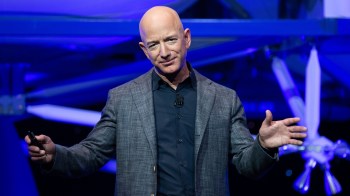TEXT OF COMMENTARY
SCOTT JAGOW: Some of the world’s richest people have been donating their money to solve some of the world’s biggest problems. Bill Gates is giving billions to fight AIDS in Africa. The founders of Google are devoting big bucks to tackle poverty, disease and global warming. Warren Buffett has pledged money to create a nuclear fuel bank to discourage countries from developing their own nuclear programs. Commentator Robert Reich believes this philanthropy is all well and good . . .
ROBERT REICH: I think it’s wonderful that a few hundred of America’s richest people are devoting some of their billions to good causes.
Last Friday, Bill Clinton wrapped up his second annual charity extravaganza with commitments of $7.3 billion to combat illness, poverty, religious and ethnic conflict and climate change, from 215 do-gooding tycoons. That includes $3 billion from Virgin Atlantic magnate Richard Branson, to develop energy sources that don’t contribute to global warming.
Remember the first George Bush’s “thousand points of light”? Well, now we have a few hundred super novas.
Forbes Magazine just published its annual list of the 400 richest Americans, and for the first time every one of them is worth more than a billion dollars. A
I remember a time when government collected lots money from people at or near the top, and then we left it to the democratic process to decide what the money would be used for. In 1960, the tycoons of America paid a marginal tax rate of 90 percent, which came to an effective rate of about 50 percent after all deductions and credits.
They also paid big estate taxes and capital gains taxes.
But in 1960, it was also the case that over two-thirds of Americans said they trusted government to do the right thing most of the time.
Now billionaire tycoons pay an effective tax rate of about 15 percent, or none at all if their accountants and tax attorneys are clever enough. But that’s understandable because now, according to surveys, two-thirds of Americans don’t trust government to do much of anything right.
So nowadays we rely on supernova rich philanthropists to give their billions to causes they deem worthy, and we applaud their generosity.
Now I don’t want to sound ungrateful or overly sentimental, but I think I preferred it the old way.
JAGOW: Former Labor Secretary Robert Reich now teaches public policy at the University of California Berkeley. Share your comments with us. Log on to our website, marketplace.org and send us an email. In Los Angeles, I’m Scott Jagow. Thanks for listening and have a great day.
There’s a lot happening in the world. Through it all, Marketplace is here for you.
You rely on Marketplace to break down the world’s events and tell you how it affects you in a fact-based, approachable way. We rely on your financial support to keep making that possible.
Your donation today powers the independent journalism that you rely on. For just $5/month, you can help sustain Marketplace so we can keep reporting on the things that matter to you.


















